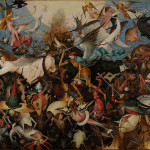We run our website the way we wished the whole internet worked: we provide high quality original content with no ads. We are funded solely by your direct support. Please consider supporting this project.

Why Did God Require Animal Sacrifice in the Old Testament?
Question:
I have a question about the atonement. Why did YHWH in the OT demand that people sacrifice animals? And if these sacrifices anticipated the ultimate sacrifice of the Messiah, as the author of Hebrews says, doesn’t this imply that Jesus’ death was necessary for God to forgive us? But why would God need his Son to die to forgive us? Did the Father need to kill his Son to placate his wrath, as I was taught? And finally, how does all this sacrifice stuff relate to the Christus Victor view of atonement that you advocate?
Answer:
Great question. I do not for a moment believe the Father needed to vent his wrath on Jesus in order to forgive us. For more about why I find this common belief to be objectionable, go here.
The first thing I’d say about animal sacrifices in the Old Testament is that it’s important to know that all Ancient Near Eastern people sacrificed animals as a way of appeasing the gods. In fact, this has been a staple of human religion around the world from the start, as Genesis 4 (with Cain and Able’s sacrifice) illustrates. Interestingly enough, there’s no suggestion in Genesis 4 that God asked Cain and/or Able to sacrifice anything. They just started doing this. I suspect this reflects the fallen human sense that we are estranged from God and that he’s angry about it, so we instinctively want to do something to rectify this.
In any case, in light of the almost universal religious practice of sacrificing animals, it seems reasonable to assume that the Israelites had been sacrificing animals a long time before Yahweh ever began to instruct them. In fact, the way some Old Testament authors refer to the sacrifice as producing “a pleasing aroma to God” reflects the cultural indebtedness of this practice, for we find this same phrase used by other people long before the Israelites. Since God must relate to people where they are at in order to gradually lead them forward, just as a missionary must do when going to pagan cultures, it seems to me that God accepted this barbaric practice as an accommodation to his fallen, culturally conditioned people. In fact, Leviticus 17:7 indicates that God commanded animal sacrifices as a way of helping his people to stop worshipping demons. So, as is often the case with God’s dealings with fallen people, it seems this command doesn’t reflect God’s ideal will. It rather reflects his accommodating will as God must choose between the lesser of two evils. (I could give hundreds of examples of this in the Old Testament, e.g. why God allowed polygamy and concubines.)
At the same time, God always brings good out of evil. So while God accepted this practice, he changed its meaning. Instead of being used to appease God’s wrath, as pagans have always believed, these sacrifices were used to remind people that covenant breaking with the God of life inevitably leads to death. This is why animals were sacrificed by being cut in two whenever covenants were made. (In fact, the Hebrew phrase for “making a covenant” is literally “to cut a covenant”—referring to the animal that was cut in two to make the covenant). The parties entering into a covenant would walk between the animal parts after exchanging vows as a way of saying, “If I break my covenant vows, let it be to me as it is this animal.” A clear example of this is found in God’s covenant with Abraham in Genesis 15 (though, interestingly enough, only Yahweh walks between the animal parts, anticipating the crucifixion when God would be faithful on behalf of humans when we are unfaithful).
So you see that animals were sacrificed not because God needed them to forgive people but because his people needed them to remember the death consequences of sin and to therefore repent when they’d broken covenant with God. Later in Israel’s history, when people began sacrificing animals without repenting in their hearts, the Lord told them (through prophets like Isaiah, Hosea and Amos) that he despised their sacrifices, for they are meaningless without a change in heart.
So, how does this relate to the Christus Victor understanding of the atonement? We’re taught that the reason the Son of God became a human and died on the cross was to “destroy the one who had the power of death –the devil” (Heb 2:14; cf. I Jn 3:8). This tells us a lot about why it is that covenant breaking with God leads to death. Breaking covenant leads to death not because God is unable to freely forgive us unless he first vents his wrath by killing someone. We find God forgiving people without requiring any sacrifice throughout the Bible. Breaking covenant with God rather leads to death because all sin (which is at root breaking covenant with God) enslaves us to Satan, “the destroyer” (Heb 2:14; cf. Jn 8:34; Rev. 9:11) and thus enslaves us in the kingdom of darkness (Col.1:13; cf. Ac 26:18).
The only way God could redeem us from this dire situation was for God himself to become a human and become the first faithful human covenant partner and to then bear the full death-consequences of our covenant breaking on our behalf, which is what Jesus does on the cross. This unsurpassable expression of self-sacrificial love in principle overthrew the kingdom of darkness (Col 2:14-15), just as light dispels darkness, and this in turn frees us to be united with Christ, to share in his covenant faithfulness, to receive God’s empowering grace, to be filled with God’s empowering Spirit and to thereby begin to live in a right relationship with God (which is what Scripture means when it talks about us being “righteous” before God).
There is, of course, a lot more that could be said about what Christ accomplished on the cross and how it redeems us, but I hope this suffices to show how the sacrifices in the Old Testament relate to the Christus Victor theme of the atonement.
Keep thinking…as an act of worship to God!
Greg
___
art:”Young Boy with a Lamb”
by: Franz Marc
date: 1911
Category: Q&A
Tags: Animal Sacrifice, Atonement, Christus Victor, Forgiveness, God, God's Wrath, Satan
Topics: Christus Victor view of Atonement, Interpreting Violent Pictures and Troubling Behaviors
Related Reading

The Cruciform Beauty of Horrific Divine Portraits
“Only a person who is aware of the crucified Christ can properly understand Scripture.” Luther (Table Talks) In the last three posts I’ve been wrestling with how insights from Matthew Bate’s book, The Hermeneutics of the Apostolic Proclamation might help us interpret violent portraits of God in the OT in a way that discloses how…

What Are the “Keys to the Kingdom”?
And I tell you that you are Peter [petros = rock], and on this rock I will build my church, and the gates of Hades will not overcome it. I will give you the keys of the kingdom of heaven; whatever you bind on earth will be bound in heaven, and whatever you loose on…

Resisting Evil
The New Testament refers to Satan as the “god of this age” and the “ruler of the power of the air” (2 Cor 4:4; Eph.2:2). In the first century Jewish worldview, “air” referred to the domain of spiritual authority over the earth. The author, Paul, was thus saying that the spiritual environment of the earth…

Podcast: Did Hell Exist Before Satan Fell?
Children ask the cutest questions. Greg considers the origins of hell and other burning questions. http://traffic.libsyn.com/askgregboyd/Episode_0460.mp3

Theology That Accounts for Terrorism
The general assumption of both the Old and the New Testaments is that the earth is virtually engulfed by cosmic forces of destruction, and that evil and suffering are ultimately due to this diabolical siege. Jesus defined himself and his ministry in terms of aggressively warring against Satanic forces. Both he and his disciples recognized…

Jesus and the Reality of Spiritual Warfare
In yesterday’s post, we discussed how challenging it can be to believe in the reality of a spiritual realm in the modern world. Today, let’s look at how Jesus’ ministry relates to this spiritual reality. While Jesus and his followers of course believed that God was the ultimate Lord over all creation, they clearly viewed…
